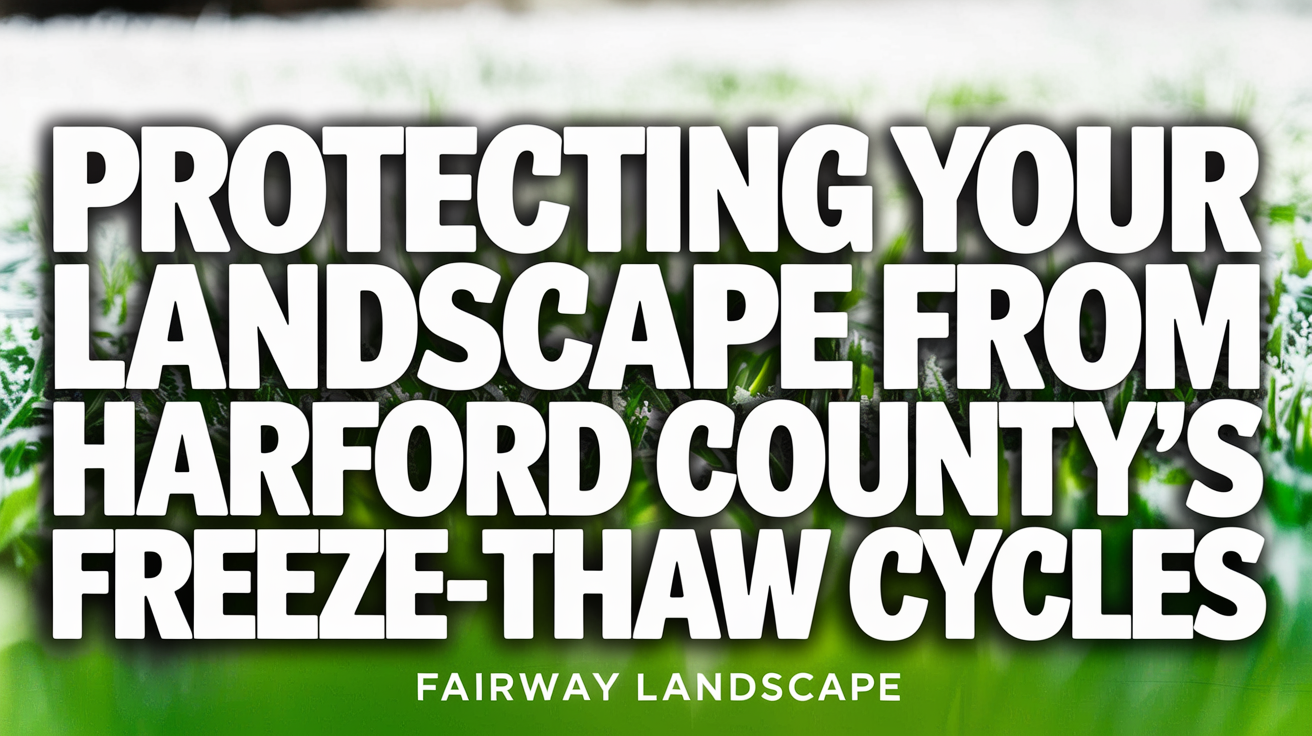As January approaches, Harford County residents are familiar with our region’s unpredictable winter weather patterns. One day might bring temperatures in the teens, while the next climbs into the 50s. While these fluctuations might seem like welcome breaks from winter’s chill, they create one of the most destructive forces in our landscapes: freeze-thaw cycles. These rapid temperature swings can devastate plants, hardscapes, and soil structures – often causing damage that isn’t fully revealed until spring. Understanding and mitigating these effects is crucial for maintaining your landscape investment.

Understanding Freeze-Thaw Cycles in Harford County’s Climate
Harford County’s proximity to the Chesapeake Bay creates a unique microclimate that experiences more freeze-thaw cycles than many surrounding regions. When soil freezes, water within it expands by approximately 9%, creating tremendous physical force. As temperatures rise, this ice melts, allowing the soil to settle – often unevenly. This continuous expansion and contraction throughout winter months can wreak havoc on your landscape.
The frequency of these cycles matters more than extreme cold. Areas with consistent deep freezes actually experience less damage than our region, where temperatures regularly oscillate above and below freezing. Meteorological data shows that Bel Air MD typically experiences 40-50 freeze-thaw cycles annually – significantly more than areas just 50 miles inland or further north where winter temperatures remain more consistently below freezing.
Soil composition dramatically affects freeze-thaw susceptibility. Clay soils, which are common throughout Harford County, retain more moisture and therefore experience more dramatic expansion and contraction than sandy soils. This explains why properties in certain parts of our county suffer more winter landscape damage than others, even with identical plant material and hardscape elements.
How Freeze-Thaw Cycles Damage Plants and Roots
Root disruption occurs when freezing soil physically tears delicate root structures. As soil expands and contracts, roots can be severed or exposed to air pockets. This damage reduces a plant’s ability to absorb water and nutrients when growth resumes in spring. Our professional winter landscaping services include soil management techniques that minimize this destructive process.
Frost heaving literally pushes plants out of the ground. You’ve likely noticed perennials or small shrubs that appear “higher” in spring than when planted. This frost heaving exposes crown tissue and roots to desiccating winter winds and cold temperatures, often killing plants that would otherwise survive winter cold. Proper mulching and soil preparation are critical frost heaving solutions that protect vulnerable plants.
Bark splitting affects trees and shrubs when rapid temperature changes cause uneven expansion and contraction. The south or southwest side of woody plants often warms significantly during winter days, only to rapidly refreeze when the sun sets. This creates vertical splits in bark that provide entry points for diseases and pests. Our winter plant protection strategies include preventative measures for susceptible species.
Protecting Vulnerable Plants from Winter Temperature Fluctuations
Recently planted material requires special attention. Plants installed within the past year haven’t established extensive root systems and are particularly vulnerable to freeze-thaw damage. Our professional winter landscaping programs provide additional protection for these recent investments, including specialized mulching techniques and protective barriers when appropriate.
Proper mulching is your first defense against freeze-thaw cycles. A consistent 2-3 inch layer of organic mulch insulates soil, moderating temperature fluctuations and reducing the frequency and severity of freezing and thawing. However, improper mulching techniques can cause more harm than good. Our experts apply mulch correctly, avoiding “volcano mulching” that damages trunks while ensuring adequate coverage extends to the drip line.
Anti-desiccant sprays provide valuable protection for broadleaf evergreens. Plants like rhododendrons, hollies, and boxwoods lose moisture through their leaves all winter while frozen soil prevents water uptake. This double threat is exacerbated by freeze-thaw cycles. Professional application of anti-desiccant creates a protective coating that reduces moisture loss during winter months.
Hardscape Protection: Preventing Costly Damage to Patios and Walkways
Paver patios and walkways often show the most visible effects of freeze-thaw cycles. As water seeps into joints between pavers and then freezes, the expansion can displace individual units, creating uneven surfaces and tripping hazards. Professional winter maintenance includes clearing debris from joints and ensuring proper drainage to minimize water accumulation.
Concrete surfaces require special attention in Harford County’s climate. Microscopic cracks allow water penetration, and subsequent freezing expands these small imperfections into significant damage. Our freeze-thaw protection services include inspection of concrete surfaces and application of appropriate sealants before winter’s worst conditions arrive.
Retaining walls face tremendous pressure during freeze-thaw cycles. Soil behind walls expands when frozen, creating lateral force that can cause shifting, cracking, or complete failure. Professional assessment identifies drainage issues or structural weaknesses that might lead to winter damage, allowing preventative measures before problems develop.
Soil Management Techniques for Winter Landscape Protection
Improving drainage is often the most effective freeze-thaw protection strategy. Saturated soil experiences more dramatic expansion when frozen than properly drained soil. Our landscape professionals assess drainage patterns throughout your property, identifying areas where water accumulates and implementing solutions ranging from simple grade adjustments to comprehensive drainage system installation.
Soil amendments can significantly reduce freeze-thaw damage. Incorporating organic matter improves soil structure and reduces the cohesive properties of clay soils that make them particularly susceptible to frost heaving. Our professional winter landscaping programs include targeted soil improvement in vulnerable areas of your Harford County landscape.
Fall aeration creates space for expansion within soil rather than upward. By creating thousands of small cores throughout lawn areas, aeration provides “relief valves” for freezing soil, reducing the upward pressure that causes frost heaving. This simple preventative measure significantly reduces winter damage to turf and nearby plantings.
Professional Winter Landscaping Strategies for Bel Air MD Properties
Site-specific assessment is essential for effective freeze-thaw protection. Every property has unique microclimates created by buildings, mature trees, slope, and exposure. Our professional evaluation identifies your landscape’s specific vulnerability points and develops targeted protection strategies rather than applying one-size-fits-all solutions.
Windbreak creation provides multiple benefits during winter months. Strategic placement of temporary or permanent windbreaks reduces desiccation of plant tissues while also moderating temperature fluctuations. Areas protected from prevailing winds experience fewer and less severe freeze-thaw cycles than exposed locations.
Snow management decisions significantly impact freeze-thaw damage. Improper snow piling creates problematic conditions when melting occurs. Our comprehensive winter services include snow removal plans that consider landscape health, directing snow away from vulnerable plants and creating meltwater paths that don’t compromise soil stability.
Specialized Protection for Different Landscape Elements
Perennial beds benefit from specific winter protection strategies. Leaving some plant material standing through winter provides natural insulation and snow-catching benefits that moderate soil temperature fluctuations. Our professional approach balances aesthetic considerations with plant protection, selectively cutting back perennials based on their specific characteristics and location.
Container plantings face extreme freeze-thaw risk. Soil in containers freezes more quickly and deeply than ground soil, and the restricted root zone provides nowhere for plants to escape damage. Our winter plant protection services include specialized techniques for valuable container specimens, from insulating wraps to temporary relocation of particularly vulnerable containers.
Water features require professional winterization to prevent freeze-thaw damage. Pumps, pipes, and containment structures can all suffer catastrophic damage from expanding ice. Our comprehensive winterization process ensures all components are properly drained, protected, or removed before freezing temperatures arrive.
Monitoring and Intervention During Winter Months
Regular inspection throughout winter allows early intervention when problems develop. Our professional winter landscaping programs include periodic property assessments during January and February – the months when freeze-thaw cycles are most frequent and damaging. This proactive approach identifies developing issues before they cause significant damage.
Emergency intervention after extreme weather events can prevent lasting damage. Particularly dramatic temperature swings or unusual precipitation patterns may necessitate additional protective measures mid-winter. Our responsive service ensures your landscape receives appropriate attention when unusual conditions threaten your valuable plants and hardscape elements.
Documentation of winter conditions informs spring restoration efforts. By tracking specific damage patterns throughout winter, our professionals develop targeted spring recovery plans that address root causes rather than just symptoms. This comprehensive approach prevents recurring problems in subsequent winters.
Spring Recovery from Freeze-Thaw Damage
Early assessment as snow melts reveals the full extent of winter damage. Our professional evaluation identifies plants that have suffered significant root disruption, hardscape elements requiring repair, and soil areas needing restoration. This comprehensive inventory allows prioritized response as growing conditions return.
Soil recompaction and grade restoration corrects frost heaving effects. Plants pushed upward by freezing soil often require careful excavation and proper replanting to ensure roots are adequately covered and crowns are at appropriate depths. Our experienced landscape professionals perform these delicate operations without causing additional stress to already compromised plants.
Proactive planning prevents future damage cycles. Each winter provides valuable information about your property’s specific vulnerability patterns. Our professional team documents these patterns and implements increasingly refined protection strategies in subsequent years, progressively reducing winter damage to your valuable landscape.
Partner with Fairway Landscape for Complete Winter Protection
At Fairway Landscape, we offer comprehensive freeze-thaw protection services throughout Harford County. Our experienced professionals understand the unique challenges of our regional climate and implement proven strategies to minimize winter damage to your valuable landscape investment. From preventative measures in fall to responsive intervention during winter and restoration in spring, our complete service package ensures your landscape remains beautiful and healthy despite Harford County’s challenging freeze-thaw cycles.
Contact us today to schedule your professional winter landscape assessment. Our experts will evaluate your property’s specific vulnerabilities and develop a customized protection plan that addresses your landscape’s unique needs. Don’t let this winter’s freeze-thaw cycles damage your valuable plants and hardscape elements – partner with Fairway Landscape for professional protection that preserves your landscape investment.

